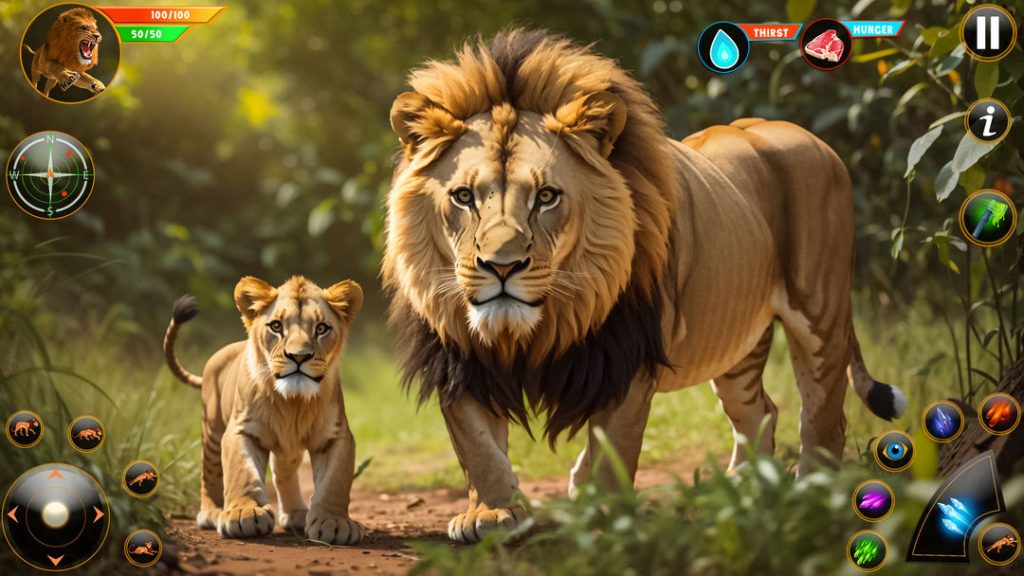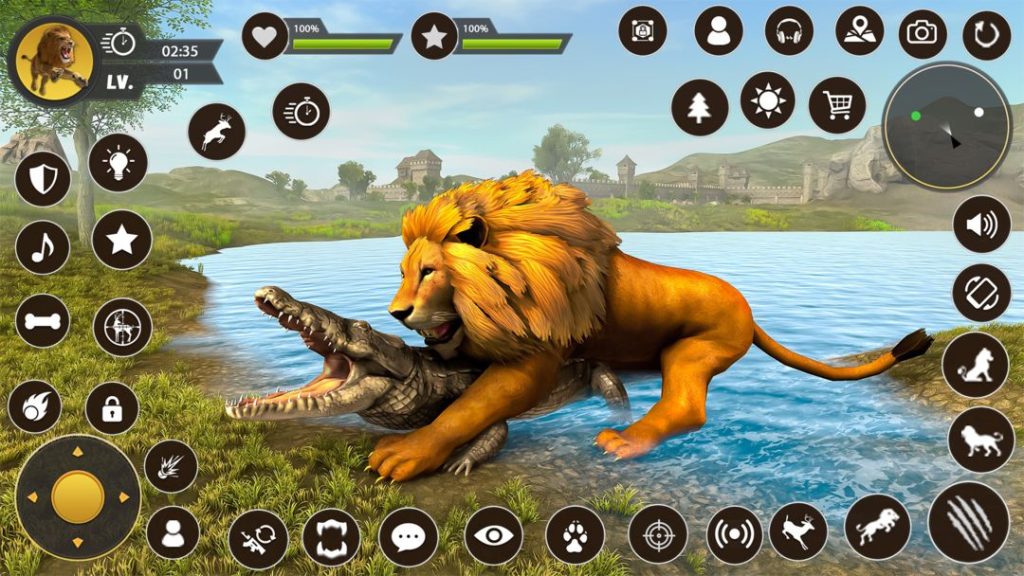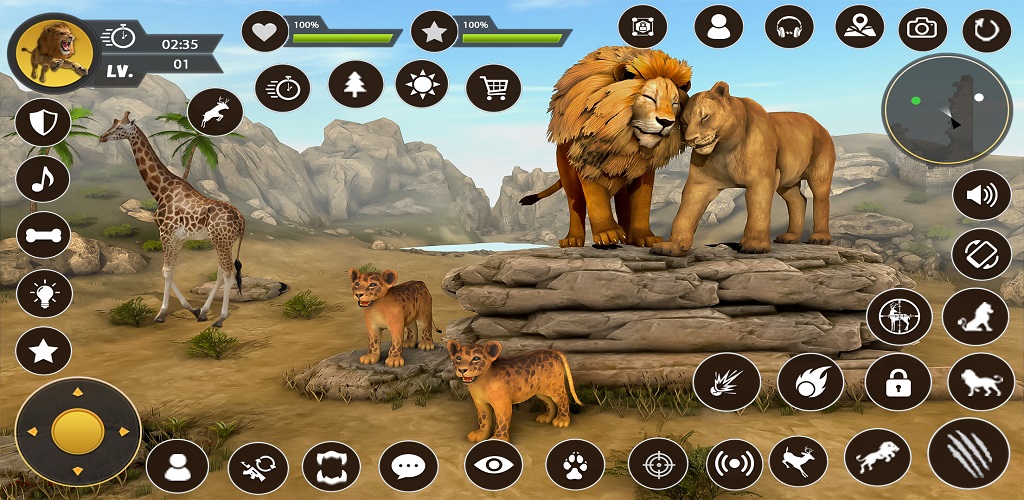Imagine standing in the vast African savannah, surrounded by the tall golden grass and the scorching heat of the sun beating down on you. As you gaze across the horizon, you spot a majestic lion, its regal mane flowing in the wind. Your curiosity piques, and you find yourself wondering, “What’s a lion’s favorite game?” You may be surprised to discover that these kings and queens of the animal kingdom have a playful side too. In this article, we will explore the fascinating world of lions and uncover the answer to the intriguing question of their favorite game.
1. Introduction
Exploring the preferences of lions
Lions, the majestic creatures of the animal kingdom, have always captivated our imagination. From their regal presence to their fearsome roar, there is a certain allure to these apex predators. But have you ever wondered what games these mighty beasts engage in for fun? In this article, we will delve into the world of lion play and uncover the mysteries behind their favorite games.
Understanding the importance of play for lions
Play is not only reserved for humans and domesticated animals; it is a fundamental aspect of a lion’s life as well. Just like other members of the big cat family, lions engage in various forms of play throughout their lives. Play is crucial for their physical, mental, and social development. From nurturing their instincts to building important skills, playtime plays a vital role in a lion’s life.
Uncovering the mystery behind a lion’s favorite game
While many games and activities capture the lion’s attention, uncovering their favorite game is a task that requires careful observation and study. In this article, we will explore different types of play behaviors exhibited by lions, ranging from hunting simulations to social play and object play. By understanding these various forms of play, we hope to shed light on the mysterious world of a lion’s favorite game.
2. Lion Behavior and Play
Nurturing instincts through play
Play is an essential way for lion cubs to nurture and develop their predatory instincts. Just like human children, lion cubs engage in play fights and mock hunts, which help them understand the basics of hunting and develop their strength and agility. Through play, they learn valuable lessons about stalking, pouncing, and capturing prey, preparing them for life as skilled hunters in the wild.
Social play among lion cubs
Lion cubs often engage in social play, which helps them build bonds within the pride and develop their social skills. These playful interactions involve chasing, wrestling, and mock battles among the cubs. Through these activities, they not only bond with their siblings but also learn important social cues and communication skills that will serve them well as they grow into adult lions.
Intriguing play behaviors in adult lions
Contrary to popular belief, play is not limited to lion cubs alone. Adult lions also exhibit fascinating play behaviors. From affectionate wrestling matches to chasing each other around the savannah, adult lions engage in play to stay mentally and physically stimulated. This playfulness serves as a form of exercise and entertainment for these magnificent creatures, showcasing their playful side even in adulthood.
3. Hunting Simulations
Stalking and pouncing games
One of the most intriguing forms of play among lion cubs and adult lions alike is the simulation of hunting behavior. Lions engage in stalking and pouncing games, imitating the movements and actions involved in a real hunt. This play helps them sharpen their reflexes and hone their hunting skills, as they learn to move with stealth and precision.
Imitating prey movements
In addition to stalking and pouncing, lions also imitate the movements of their potential prey. Whether it be the agile leap of a gazelle or the graceful walk of an antelope, lions mimic these movements during their play sessions. By doing so, they develop an understanding of their prey’s behavior and movements, which proves beneficial during real hunts in the wild.
Enhancing hunting skills through play
While play is undoubtedly enjoyable for lions, it also serves a practical purpose. Through hunting simulations, lions enhance their hunting skills, ensuring they are well-prepared when it comes to capturing their next meal. These play sessions allow them to refine their tactics, improve their coordination, and maintain their physical fitness, leading to greater success as hunters.
4. Tug of War
Lions’ affinity for tug of war
Among the many games lions enjoy, one of their favorites is tug of war. Whether it be with a fallen tree branch or even with their fellow pride members, lions engage in this playful activity with great enthusiasm. The game of tug of war showcases their strength and determination, as they fiercely compete to claim the prize.
Strength-building exercise
Tug of war not only provides entertainment but also serves as a strength-building exercise for lions. As they exert force to pull an object or their pride members, their muscles develop and grow stronger. This game acts as a natural workout routine, making them physically fit and enhancing their survival capabilities in the wild.
Social bonding and dominance display
Tug of war is not only about physical strength; it is also a means for lions to establish dominance within the pride. By engaging in this game, individuals can showcase their power and assert themselves as leaders. Additionally, tug of war fosters social bonding within the pride, as it creates opportunities for cooperation and interaction between pride members.
5. Chase and Wrestling
Playful chasing among pride members
Chasing is a common behavior observed during lion play. Whether it be chasing their siblings or fellow pride members, lions indulge in this activity to experience the thrill of a chase. Running at high speeds, they exhibit their agility and speed, providing both mental stimulation and physical exercise.
Mock wrestling matches for fun
Wrestling is another favorite game among lions, providing them with an opportunity to express their playful nature. Lions engage in mock wrestling matches, emphasizing their physical strength and testing their skills against one another. These playful battles are not intended to cause harm but rather to foster camaraderie and entertainment within the pride.
Building agility, speed, and coordination
Chase and wrestling games play a significant role in developing and refining a lion’s agility, speed, and coordination. Through these playful activities, lions strengthen their muscles, improve their reflexes, and enhance their hunting abilities. The joy they experience during these games is evident as they sprint, jump, and dodge with grace and precision.
6. Object Play
Fascination with toys and other objects
Lions, despite their wild nature, can also find joy in inanimate objects. They display a fascination with toys, such as balls or ropes, provided by caretakers or in captivity. This object play stimulates their curiosity and satisfies their innate desire to explore their environment.
Interaction with natural elements like branches
In their natural habitat, lions often encounter various natural elements they can use for play. Fallen branches or logs become sources of entertainment and engage their predatory instincts. By interacting with these objects, lions simulate hunting scenarios and get the opportunity to exercise their claws and jaws.
Utilizing environmental objects for amusement
Lions can be creative in finding amusement from objects found in their environment. From playing with carcasses to pawing at rocks or trees, they utilize whatever is available to them for their enjoyment. This resourcefulness underscores the adaptability of lions and their ability to find pleasure in the simplest of things.

7. Puzzle and Foraging Games
Mental stimulation for lions
Play isn’t just about physical activities; mental stimulation is equally important for a lion’s well-being. Puzzle and foraging games help keep their minds sharp and active. These games challenge their problem-solving abilities and encourage them to explore different strategies to obtain their food rewards.
Encouraging problem-solving abilities
Puzzle and foraging games offer lions the opportunity to use their intelligence and problem-solving skills. By presenting them with tasks that require maneuvering and manipulation, these games stimulate their cognitive abilities and provide a mental challenge. From puzzles involving hidden treats to interactive feeders, lions must use their wits to unlock the rewards.
Challenging food puzzles as a favorite game
Among the various puzzle and foraging games, lions particularly enjoy food puzzles. These games involve hiding food, either in toys or in specific areas, requiring them to use their senses and intelligence to locate and retrieve their rewards. This type of play closely mimics the problem-solving nature of hunting in the wild, providing both mental stimulation and a sense of accomplishment.
8. Water Play
Lions’ surprising affinity for water
While not typically associated with water-related activities, lions have shown a surprising affinity for water play. Whether it’s a natural water hole or a man-made pool in captivity, lions have been observed splashing, wading, and even playfully diving into the water. This behavior adds an element of surprise to their playful repertoire.
Splashing and playfully diving
Lions engage in splashing and playfully diving, reminiscent of their feline cousins, tigers. They cool off in the water, enjoying the refreshing sensation while displaying their agility and grace. These water play activities not only provide physical exercise but also contribute to their overall well-being by enabling them to maintain their hygiene.
Cooling off and maintaining hygiene
In addition to the recreational aspect, water play serves the practical purpose of cooling off and maintaining hygiene for lions. The water helps them regulate their body temperature, especially in hot climates, and supports their grooming routine. These playful water activities ensure that lions remain comfortable and clean, enhancing their overall health and vitality.
9. Role Play and Mimicry
Imitating behaviors of other animals
Lions, in their playful nature, exhibit a sense of curiosity and adaptability by imitating the behaviors of other animals. Whether it’s mimicking the movement of a gazelle or the roar of a fellow lion, this role play allows them to explore different roles and develop their adaptability.
Playing out social interactions
Role play also extends to mimicking social interactions within the pride. Lions may engage in mock fights or participate in activities that resemble courtship behaviors. Through these playful interactions, they develop and refine their social skills, ensuring smooth dynamics within the pride.
Developing adaptability and flexibility
Role play and mimicry provide lions with a platform to develop adaptability and flexibility. By experimenting with different behaviors and roles, they become more adept at handling diverse situations in the wild. This kind of play prepares them for the challenges they may face, ultimately increasing their chances of survival.
10. Conclusion
Emphasizing the diversity of lion play
In conclusion, exploring the world of lion play reveals a remarkable diversity in their playful behaviors. From hunting simulations to tug of war, chase and wrestling to object play, lions engage in a range of activities that showcase their agility, intelligence, and social nature. This diversity highlights the multifaceted nature of play in their lives.
Acknowledging individual preferences
Just like humans, lions have their own individual preferences when it comes to play. Some may thoroughly enjoy wrestling with their pride members, while others might derive more pleasure from chasing and pouncing games. Understanding and appreciating these individual preferences enriches our understanding of their unique personalities.
Appreciating the importance of play for lions
Lastly, it is crucial to appreciate the importance of play for lions. Play is not merely a form of entertainment; it is an integral part of their growth, development, and well-being. From nurturing their instincts and strengthening their hunting skills to fostering social bonds and providing mental stimulation, playtime plays a vital role in a lion’s life.
As we continue to observe and study lions, let us cherish their playful nature and the beauty it brings to their existence. The world of lion play is a captivating one, filled with joy, camaraderie, and the everlasting spirit of the king of the savannah.


